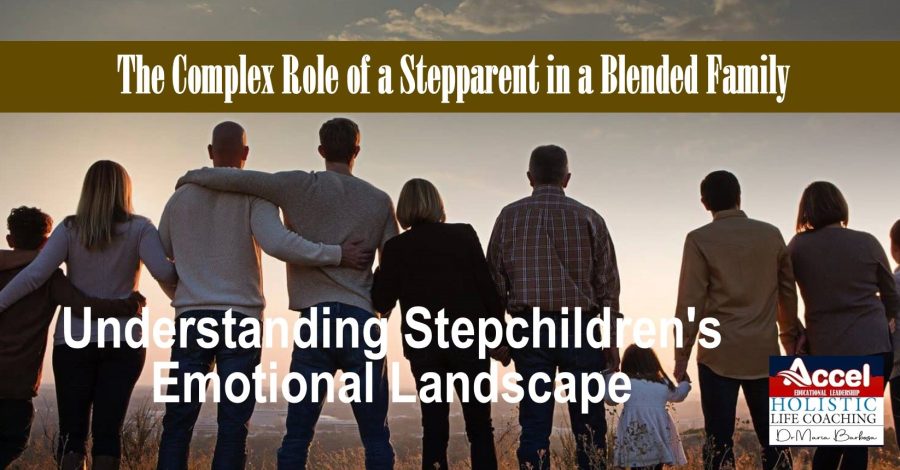Navigating Acceptance:
Blended families present unique dynamics, especially regarding the acceptance of a stepparent by stepchildren. One of the most emotionally complex challenges arises when stepchildren-whether young or adult-struggle to embrace a stepparent despite the latter’s sincere efforts to foster a bond. These tensions often stem from feelings of loyalty to the biological parent, territorial instincts, and fears of losing their special place in their parent’s life. When a stepparent joins the family as a second or even third spouse, the path to acceptance can become even more intricate.
Understanding Stepchildren’s Emotional Landscape
Navigating the delicate relationships within a blended family requires understanding the emotional landscape of stepchildren. Many stepchildren, regardless of age, grapple with loyalty conflicts toward their biological parents. Accepting a stepparent may feel like a betrayal, even if the absent parent is no longer actively involved or no longer here. This internal conflict can create emotional barriers that are difficult to overcome, no matter how loving or accommodating the stepparent may be.
For adult stepchildren, the dynamics often become even more complex. They may see themselves as territorial. Territorial feelings can also emerge-adult children may perceive the stepparent as an intruder occupying a cherished and exclusive space in their parent’s life.
The Stepparent’s Struggle for Acceptance
Stepparents often face an uphill battle in earning acceptance, particularly when their sincere efforts are met with resistance or rejection. It can be deeply disheartening to extend kindness, patience, and support only to be pushed away. This rejection can feel personal, leading to feelings of inadequacy and emotional exhaustion.
This struggle echoes the biblical theme of enduring trials with patience. James 1:2-4 reminds us, “Consider it pure joy, my brothers and sisters, whenever you face trials of many kinds, because you know that the testing of your faith produces perseverance.” Jesus Himself understood rejection. John 1:11 notes, “He came to that which was His own, but His own did not receive Him.” Stepparents can find solace in knowing that even Christ experienced rejection, yet He continued to love unconditionally. This biblical perspective encourages stepparents to persist with compassion, recognizing that acceptance may take time.
The core of this struggle frequently lies in unmet expectations. While a stepparent may hope for warmth and eventual closeness, stepchildren may remain emotionally closed off, unwilling or unable to reciprocate. Sometimes, stepchildren perceive the stepparent as a threat to the family unit.
Emotional Ownership and Family Dynamics
A significant reason stepchildren may resist accepting a stepparent is the concept of emotional ownership. They may feel an unshakable bond with their biological parent-one they believe should remain exclusive. When a stepparent enters the picture, especially as a second or third spouse, it can feel like someone is taking up space that rightfully belongs to them.
The Overlooked Role of Stepparents in Financial Stability
This situation highlights a deeper issue: the failure to recognize the stepparent’s vital contributions to the couple’s success and stability. Adult stepchildren may focus on perceived entitlements, overlooking the stepparent’s integral role in building the financial foundation they now covet.
The Invisible Contribution to Financial Stability
In many blended families, financial success wasn’t achieved in isolation. The stepparent often plays a significant role in creating stability-whether by contributing financial balance, managing household expenses, or providing emotional support that enabled the biological parent to focus on career growth.
Yet, adult stepchildren frequently dismiss this contribution. They may view the biological parent’s wealth as solely theirs by right, disregarding the stepparent’s role in building that foundation. This leads to a distorted narrative where the stepparent is unfairly seen as someone who “took” rather than “helped build.”
Mistrust and Misplaced Contempt
Even when a stepparent actively supports the biological parent in helping adult children financially, their efforts are often viewed with suspicion. Emotional and psychological factors contribute to this mistrust:
- Entitlement Mentality: Adult stepchildren may feel entitled to their biological parent’s wealth, fearing the stepparent will diminish their inheritance.
- Skewed Perception of Loyalty: Some adult children view any relationship outside the original family unit as a betrayal, believing that only they should benefit from their biological parent’s success.
- Emotional Projection: Unresolved grief, insecurity, or past family trauma can lead adult children to project negative emotions onto the stepparent.
- Fear of Losing Influence: Adult children may worry that the stepparent holds undue sway over financial decisions, fueling narratives of manipulation without basis.
The Emotional Toll on the Stepparent
Being wrongly accused of selfish intentions-despite years of kindness and support-takes a heavy emotional toll. Constant rejection and mistrust can lead to feelings of frustration. It creates a lonely space where no matter how much good is done, the negative perception persists.
The strain often affects the marriage as well. The biological parent may feel torn between defending their spouse and maintaining harmony with their children, leading to emotional exhaustion and tension.
Finding Peace and Validation as a Stepparent
Ultimately, stepparents must recognize that their worth isn’t diminished by stepchildren’s inability or unwillingness to acknowledge their contributions. Their role in building emotional and financial stability is valid, regardless of how others perceive it.
Finding peace means letting go of the need for external validation. By focusing on the strength of the marriage, maintaining personal integrity, and setting healthy boundaries, the stepparent can find fulfillment and peace amidst rejection.
Embracing Acceptance and Prioritizing Happiness
Letting Go of the Need for Approval
Being a stepparent can be a journey filled with emotional highs and lows, especially when acceptance from stepchildren never comes. Despite love, patience, and countless attempts at reconciliation, rejection may persist. This experience can be deeply painful, leading to self-doubt and emotional pain.
One of the hardest lessons is understanding that you cannot control others’ perceptions. Despite your best efforts, stepchildren-especially adults-may cling to their own narratives shaped by loyalty conflicts and unresolved emotions.
At some point, the healthiest step is letting go of the need for their approval. This doesn’t mean giving up on kindness or respect but releasing yourself from the emotional burden of proving your worth. Letting go allows you to reclaim peace and focus on your well-being.
Finding Your Place of Peace: To find peace as a stepparent, prioritize aspects of life that bring joy and fulfillment:
- Acknowledge Your Efforts: Recognize your patience, compassion, and resilience. Honor your journey, even if the outcome wasn’t what you hoped for.
- Focus on Your Partnership: Strengthen your bond with your spouse, the core of your blended family.
- Create Healthy Boundaries: Protect your emotional space by setting limits on interactions that cause distress.
- Pursue Personal Fulfillment: Engage in hobbies, relationships, and activities that bring you joy.
- Practice Self-Compassion: Treat yourself with the same kindness you’ve extended to others.
Prioritizing Emotional Health
Maintaining open, honest communication with your partner is essential. Together, you can create a supportive environment where both of you feel heard and valued. Your partner should also help reinforce boundaries with their children, ensuring respect for your relationship.
Embracing Peace and Moving Forward
Finding peace as a stepparent doesn’t mean giving up on love-it means protecting your emotional health and focusing on what truly matters. You did your part, extended compassion, and tried to build bridges. If acceptance never came, that reflects others’ emotional journeys, not your worth.
Now is the time to reclaim your happiness, strengthen your marriage, and focus on the relationships that bring you joy. By doing so, you honor your journey and find the peace you deserve.
www.drmariabarbosa.com Dr. Maria Barbosa specializes in helping couples navigate family conflicts by offering effective strategies to restore balance and harmony in relationships. Her primary focus is to assist clients in prioritizing emotional health, fostering self-awareness, empathy, and healthy communication among all parties involved. Through personalized therapeutic approaches, she guides couples in recognizing harmful behavior patterns, setting healthy boundaries, and developing tools to resolve conflicts constructively, thereby strengthening family bonds and promoting the emotional well-being of each family member.
Discover more from Dr Maria Barbosa
Subscribe to get the latest posts sent to your email.





